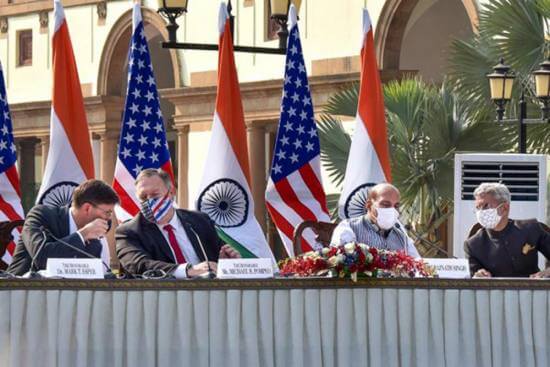NEW DELHI: In major boost to India, the US Congress through a bipartisan law, the National Defence Authorisation Act (NDAA) 2021 has condemned China for its aggression in eastern Ladakh. A resolution in the NDAA urges China to end its military aggression against India along the Line of Actual Control (LAC) and in the Indo-Pacific region.
The bipartisan Congressional provision became a law on Friday after the US Congress overrode outgoing president Donald Trump’s veto on the $740 billion defence policy bill.
The media quoted Congressman Raja Krishnamoorthi, recently re-elected to the US House of Representatives for the third time, as saying: “Through today’s New Year’s Day vote in the Senate, Congress has made the National Defence Authorisation Act into law, including elements of my resolution calling on China to end its military aggression towards India and others in the broader Indo-Pacific region”.
Krishnamoorthi added: “The Chinese military’s violent aggression along the Line of Actual Control with India and elsewhere is unacceptable, and the passage into law of this legislation sends a clear message of support and solidarity to India and our other partners across the world as we enter the New Year”.
The US has over the past few months strongly come out in support of countries and ethnic groups which have been at the receiving end of Chinese militarism and ethnic cleansing during 2020 � one of the toughest years for communities across the world due to the coronavirus pandemic, which had its origins in Wuhan, China.
The NDAA law says that China “should work with” India toward de-escalating the situation along the LAC through existing diplomatic mechanisms and refrain from attempting to settle disputes through coercion or force.
Barely ten days back the US Congress had passed a bill, the Tibetan Policy and Support Act of 2020 (TPSA), supporting the cause of Tibet and the right of Tibetans to choose a successor to the Dalai Lama. The law was immediately hailed as “historic” by Dr Lobsang Sangay, the President of the Central Tibetan Administration and also the political successor to the Dalai Lama. The TPSA calls for the US to establish a US consulate in Lhasa and stresses on the right of Tibetans to choose a successor to the Dalai Lama.
In a similar move to hold China accountable to the world, the US Congress in May 2020 had overwhelmingly passed a bill to punish senior officials of the Chinese Communist Party for putting a million Uyghurs in concentration camps. The Uyghur Human Rights Policy Act, 2020 seeks to hold Chinese officials accountable for human rights violations, use of indoctrination camps, putting people into forced labour and launching intrusive surveillance against Uyghurs and other minorities in China.
The New York Times quoted Speaker Nancy Pelosi as saying: “With this overwhelming bipartisan legislation, the United States Congress is taking a firm step to counter Beijing’s horrific human rights abuses against the Uighurs. We must continue to raise a drumbeat and shine the light of abuse perpetrated by Beijing against the Uighurs whenever we can, from this House floor to the State Department to other multilateral institutions.”
The global climate has turned overwhelmingly against China in the last one year over its non-cooperative attitude in tracing the origins of the coronavirus while trying to pin the blame on countries like the US and India.
Countries are beginning to confront China over staking claims to vast regions in the neighbourhood that include South Asia, the South China Sea and the East China Sea. It was in June when China launched a primitive-style assault with nail-studded sticks along the LAC in June which was stoutly resisted by Indian forces. Since then China has amassed nearly 50,000 heavily armed troops on the Indian border.
South East Asian countries like Vietnam, Malaysia, the Philippines, Brunei and Taiwan along with South Asian nations like India and Bhutan are opposing Chinese military expansionism in their regions. On the other hand, Western countries like Japan, the US, Australia, France and Germany too are consolidating themselves against a belligerent China over trade wars, abuse of human rights, stealing technologies and spying.
In less than a year, the US Congress has come together a number of times to condemn China for its belligerence towards neighbouring countries as well as ethnic minorities in its own land.







